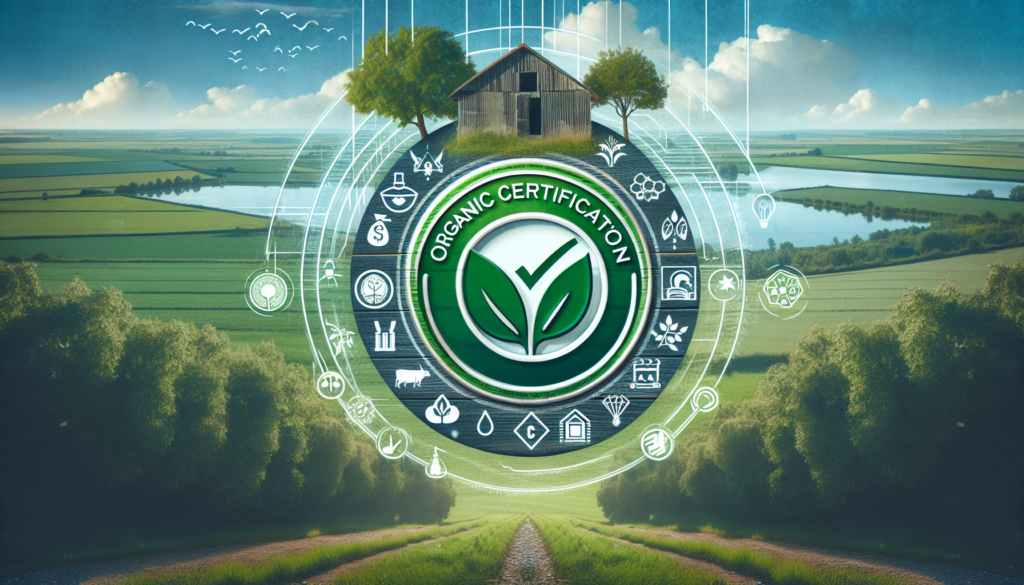Organic certification has become increasingly important in today’s society, with more and more consumers seeking out organic products. However, like any decision, there are pros and cons to obtaining this certification. On one hand, organic certification ensures that the products have been produced using strict guidelines, free from harmful chemicals and pesticides. On the other hand, the certification process can be time-consuming and expensive for farmers and producers. In this article, we will explore the pros and cons of organic certification, helping you make an informed decision about whether it’s the right choice for you.
Pros of Organic Certification
Assurance of quality and safety
Organic certification ensures that products meet strict guidelines and standards, providing you with the assurance of quality and safety. The certification process requires rigorous inspections and compliance with organic standards, ensuring that organic products are produced without the use of synthetic chemicals or genetically modified organisms (GMOs). By choosing organic certified products, you can have confidence in the quality of what you consume, knowing that it has been produced following sustainable and environmentally friendly practices.
Supports sustainable farming practices
Organic certification promotes sustainable farming practices and encourages farmers to prioritize environmental conservation. These practices include promoting soil health and fertility through natural fertilizers and compost, conserving water resources through efficient irrigation techniques, reducing pollution and erosion by restricting the use of synthetic chemicals, and preserving biodiversity and ecosystems by avoiding the use of harmful pesticides. Choosing organic certified products means supporting farmers who are committed to protecting the environment and ensuring long-term sustainability in agriculture.
Builds consumer trust
Organic certification builds consumer trust by providing transparency and ensuring ethical practices in farming. The organic label provides clear information about the production methods used, allowing consumers to make informed choices. When products bear the organic certification label, consumers can have confidence that the products have been produced without the use of synthetic chemicals, GMOs, or harmful farming practices. This trust is further strengthened by the strict guidelines and inspections that organic farmers must adhere to. By choosing organic certified products, you can be confident that you are contributing to a healthier and more sustainable food system.
Access to premium markets
Organic certification opens doors to premium markets that prioritize organic products. With the rapidly growing demand for organic products, retailers and consumers are actively seeking certified organic options. By obtaining organic certification, farmers gain access to these exclusive markets, providing them with increased market opportunities and direct access to organic retailers. This access allows organic farmers to reach a larger customer base, ultimately leading to increased sales and profitability.
Higher prices for organic products
One of the major advantages of organic certification is the ability to command higher prices for organic products. Organic products are generally associated with higher quality and environmental sustainability, making them more desirable to consumers. As a result, organic farmers can charge premium prices for their products, leading to higher profit margins. These higher prices help offset the higher production costs that organic farmers may incur due to the use of organic inputs and sustainable farming practices. The opportunity for higher revenue potential makes organic certification financially beneficial for farmers.
Government support and incentives
Organic certification is supported by various government programs that provide assistance and incentives to farmers. This support includes subsidies and grants specifically aimed at supporting organic agriculture, tax incentives for organic farmers, and financial assistance for the certification process. Additionally, governments may allocate funding for research and development in organic farming methods, helping farmers improve their practices and increase productivity. The presence of government programs promoting organic agriculture underscores the importance and benefits of organic certification.

Cons of Organic Certification
Complex and expensive certification process
One of the challenges of organic certification is the complex and expensive certification process. To obtain organic certification, farmers must go through extensive documentation and record-keeping, which can be time-consuming and require significant effort. Additionally, annual inspections and audits are conducted to ensure compliance with organic standards, adding to the complexity and cost. Small-scale farmers, in particular, may find the certification process financially burdensome, as it requires additional expenses for compliance and may divert resources from other aspects of their operations.
Limited availability of organic inputs
Organic farmers face challenges when it comes to accessing organic inputs, such as fertilizers and pest control options. These inputs can be more expensive and may have limited availability compared to conventional alternatives. Organic farmers rely on natural fertilizers, compost, and biological pest control methods, which may not be as readily accessible as synthetic options. The limited availability of organic inputs can pose challenges in maintaining productivity and managing pests effectively, requiring organic farmers to explore alternative solutions and adapt their farming practices.
Stricter regulations and standards
Organic certification entails adherence to strict regulations and standards that govern organic farming practices. While these regulations are in place to ensure the integrity of organic production, they can be demanding for farmers to meet and maintain. The standards cover various aspects of farming, including soil health, pest and weed management, and animal welfare. Organic farmers must navigate these regulations and consistently meet the required standards, which can be time-consuming and require ongoing effort and resources.
Risk of contamination
Organic farmers face the risk of contamination from neighboring conventional farms or environmental factors beyond their control. Due to the potential for cross-pollination or contamination through water sources, organic farmers need to take additional precautions to protect their crops from contact with synthetic chemicals or GMOs. This risk can present challenges, especially in regions with significant conventional farming activity, making it essential for organic farmers to carefully manage their operations and implement measures to minimize the risk of contamination.
Transition period for conventional farmers
For conventional farmers transitioning to organic farming, there is a period of adjustment and transition required. During this period, farmers must follow organic practices without being eligible for organic certification. The transition period typically takes several years, during which farmers must invest in organic techniques and undergo the necessary changes in production methods. This transition can involve additional costs and challenges, as conventional farmers adapt to new practices and work towards organic certification.
Certification fees and ongoing expenses
Obtaining and maintaining organic certification involves fees and ongoing expenses that can be burdensome for farmers. Annual certification fees are required to maintain the organic certification status, in addition to renewal and inspection costs. Furthermore, record-keeping and documentation expenses are necessary to ensure compliance with certification requirements. Organic farmers may also need to invest in organic infrastructure, such as storage facilities or equipment, and allocate resources to marketing and labeling in order to differentiate their products in the organic market. These expenses can place financial strain on farmers, particularly smaller operations.


